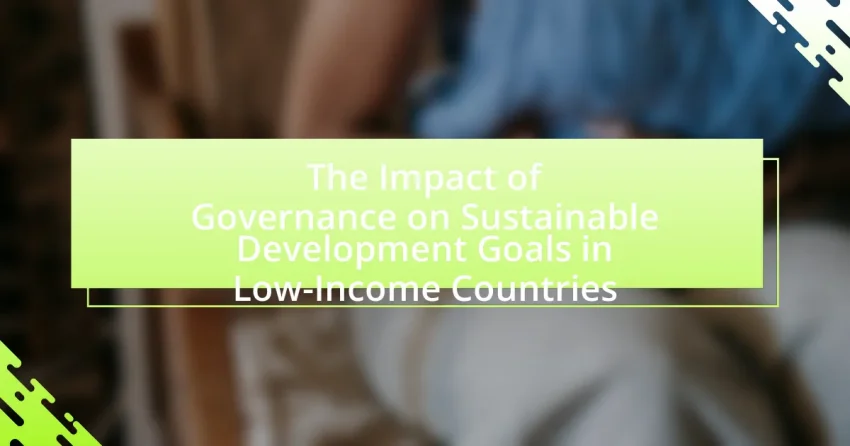The article examines the critical relationship between governance and the achievement of Sustainable Development Goals (SDGs) in low-income countries. It highlights how effective governance, characterized by transparency, accountability, and citizen participation, significantly influences policy frameworks, resource allocation, and institutional effectiveness, thereby facilitating progress towards SDGs such as poverty reduction, education, and health. The discussion includes the impact of political stability, governance quality, and accountability on development outcomes, as well as the challenges faced by low-income countries, including corruption and weak institutions. Additionally, the article outlines strategies for improving governance to support sustainable development, emphasizing the importance of community engagement and the role of international organizations in enhancing governance frameworks.

What is the relationship between governance and sustainable development goals in low-income countries?
Governance significantly influences the achievement of sustainable development goals (SDGs) in low-income countries by shaping policy frameworks, resource allocation, and institutional effectiveness. Effective governance ensures transparency, accountability, and participation, which are essential for implementing SDGs such as poverty reduction, education, and health. For instance, the United Nations Development Programme (UNDP) highlights that countries with strong governance structures are more likely to meet SDG targets, as they can mobilize resources efficiently and engage citizens in decision-making processes. Conversely, weak governance often leads to corruption and mismanagement, hindering progress towards these goals.
How does governance influence the achievement of sustainable development goals?
Governance significantly influences the achievement of sustainable development goals (SDGs) by establishing frameworks for accountability, transparency, and participation. Effective governance ensures that resources are allocated efficiently, policies are implemented effectively, and stakeholders are engaged in decision-making processes. For instance, countries with strong governance structures, such as those with low corruption levels and active civil societies, tend to perform better on SDG indicators, as evidenced by the United Nations Development Programme’s 2020 Human Development Report, which highlights the correlation between governance quality and progress on SDGs in various nations. Thus, governance acts as a critical determinant in facilitating or hindering the progress toward sustainable development objectives.
What are the key governance structures that impact sustainable development?
Key governance structures that impact sustainable development include regulatory frameworks, institutional arrangements, and stakeholder engagement mechanisms. Regulatory frameworks establish the legal and policy environment necessary for sustainable practices, such as environmental laws and resource management policies. Institutional arrangements, including government agencies and local authorities, play a crucial role in implementing and enforcing these regulations. Stakeholder engagement mechanisms, such as public consultations and partnerships with civil society, ensure that diverse perspectives are considered in decision-making processes. These structures collectively influence the effectiveness of sustainable development initiatives, as evidenced by the United Nations’ Sustainable Development Goals, which emphasize the importance of inclusive governance for achieving sustainability in low-income countries.
How do political stability and governance quality affect development outcomes?
Political stability and governance quality significantly influence development outcomes by creating an environment conducive to economic growth and social progress. Stable political systems reduce uncertainty, which encourages investment and fosters economic activities, while high governance quality ensures effective implementation of policies and equitable resource distribution. For instance, countries with stable governments and strong institutions, such as Singapore, have demonstrated higher GDP growth rates and improved human development indices compared to nations with political turmoil and weak governance, like Somalia. This correlation is supported by the World Bank, which indicates that countries with better governance experience faster economic growth and improved social indicators, thereby achieving sustainable development goals more effectively.
Why is governance critical for sustainable development in low-income countries?
Governance is critical for sustainable development in low-income countries because it establishes the framework for effective decision-making, resource allocation, and accountability. Effective governance ensures that policies are implemented efficiently, which is essential for addressing the unique challenges faced by these countries, such as poverty, inequality, and environmental degradation. For instance, according to the United Nations Development Programme, countries with strong governance structures are more likely to achieve Sustainable Development Goals, as they can mobilize resources, engage citizens, and foster partnerships. Furthermore, research by the World Bank indicates that improved governance can lead to a 20% increase in economic growth in low-income nations, demonstrating the direct correlation between governance quality and sustainable development outcomes.
What role does accountability play in governance and sustainable development?
Accountability is essential in governance and sustainable development as it ensures that leaders and institutions are answerable for their actions, fostering transparency and trust. In low-income countries, accountability mechanisms, such as audits and public reporting, can significantly enhance the effectiveness of governance by reducing corruption and mismanagement of resources. For instance, the World Bank has reported that countries with strong accountability frameworks are more likely to achieve sustainable development goals, as they can better allocate resources and implement policies that address poverty and inequality. This correlation highlights the critical role of accountability in promoting responsible governance and advancing sustainable development initiatives.
How does citizen participation enhance governance effectiveness?
Citizen participation enhances governance effectiveness by fostering transparency, accountability, and inclusiveness in decision-making processes. When citizens engage in governance, they provide valuable insights and feedback that can lead to more informed policies and programs. For instance, studies show that participatory budgeting initiatives in low-income countries have resulted in better allocation of resources, as citizens can directly influence spending priorities based on community needs. This engagement not only improves the quality of governance but also builds trust between citizens and government institutions, leading to increased compliance and support for policies.
What challenges do low-income countries face in governance related to sustainable development?
Low-income countries face significant challenges in governance related to sustainable development, primarily due to weak institutional frameworks. These countries often struggle with limited capacity to implement policies effectively, resulting in inadequate infrastructure, poor public services, and corruption. For instance, according to the World Bank, over 50% of low-income countries experience high levels of corruption, which undermines trust in government and hampers development initiatives. Additionally, political instability and lack of accountability further exacerbate governance issues, making it difficult to achieve sustainable development goals.
What are the common governance failures in low-income countries?
Common governance failures in low-income countries include corruption, lack of accountability, weak institutions, and inadequate public services. Corruption undermines trust in government and diverts resources away from essential services, as evidenced by Transparency International’s Corruption Perceptions Index, which shows that many low-income countries score poorly on corruption metrics. Lack of accountability often results in unresponsive governance, where leaders do not face consequences for their actions, leading to a disconnect between government and citizens. Weak institutions hinder effective policy implementation and enforcement, as seen in countries with fragile legal systems that struggle to uphold the rule of law. Additionally, inadequate public services, such as healthcare and education, limit citizens’ access to basic needs, further exacerbating poverty and inequality. These failures collectively impede progress toward achieving Sustainable Development Goals in these regions.
How do corruption and lack of transparency hinder progress towards sustainable development goals?
Corruption and lack of transparency significantly hinder progress towards sustainable development goals by diverting resources, undermining trust, and perpetuating inequality. Corruption leads to the misallocation of funds intended for development projects, resulting in inadequate infrastructure, poor healthcare, and limited educational opportunities. For instance, the United Nations Development Programme (UNDP) reports that countries with high corruption levels often experience slower economic growth and increased poverty rates, which directly impacts their ability to achieve sustainable development goals. Additionally, a lack of transparency erodes public trust in institutions, making it difficult to implement effective policies and engage citizens in the development process. This lack of accountability can exacerbate social inequalities, as marginalized groups are often the most affected by corrupt practices, further impeding progress towards inclusive and sustainable development.

How can governance be improved to support sustainable development goals in low-income countries?
Governance can be improved to support sustainable development goals in low-income countries by enhancing transparency, accountability, and participation in decision-making processes. Implementing robust anti-corruption measures and fostering inclusive governance structures can lead to better resource allocation and policy implementation. For instance, the World Bank reports that countries with higher levels of governance quality experience better outcomes in achieving sustainable development goals, as evidenced by improved health and education indicators. Additionally, engaging local communities in governance can ensure that development initiatives are aligned with their needs, thereby increasing effectiveness and sustainability.
What strategies can enhance governance effectiveness?
Strategies that can enhance governance effectiveness include implementing transparent decision-making processes, fostering stakeholder engagement, and utilizing data-driven policy-making. Transparent decision-making processes, such as open government initiatives, allow citizens to access information and hold leaders accountable, which has been shown to improve trust in governance. Fostering stakeholder engagement ensures that diverse perspectives are considered, leading to more inclusive policies that reflect the needs of the community. Data-driven policy-making, supported by evidence from organizations like the World Bank, demonstrates that using data analytics can lead to more informed decisions, ultimately improving governance outcomes.
How can capacity building strengthen governance frameworks?
Capacity building can strengthen governance frameworks by enhancing the skills, knowledge, and abilities of individuals and institutions involved in governance. This improvement leads to more effective decision-making, increased accountability, and better service delivery. For instance, training programs for public officials can result in improved policy formulation and implementation, which is crucial for achieving Sustainable Development Goals in low-income countries. Research indicates that countries with robust capacity-building initiatives experience higher levels of governance quality, as evidenced by the World Bank’s findings that link capacity development to improved governance outcomes.
What role do international organizations play in improving governance?
International organizations play a crucial role in improving governance by providing frameworks, resources, and expertise that enhance institutional capacity and accountability. These organizations, such as the United Nations and the World Bank, facilitate the development of governance standards and best practices, which help countries implement effective policies. For instance, the World Bank’s Governance and Anti-Corruption Strategy emphasizes the importance of transparency and accountability, leading to better governance outcomes in low-income countries. Additionally, international organizations often provide technical assistance and funding for governance reforms, which can significantly improve public sector performance and citizen engagement.
What best practices exist for governance in low-income countries?
Best practices for governance in low-income countries include enhancing transparency, promoting citizen participation, and strengthening institutions. Transparency can be achieved through open data initiatives, which allow citizens to access government information, thereby reducing corruption and increasing accountability. For instance, the Open Government Partnership has shown that countries implementing transparency measures see improved governance outcomes. Citizen participation is vital, as inclusive decision-making processes lead to policies that better reflect the needs of the population. Evidence from the World Bank indicates that participatory governance can enhance service delivery and foster trust in government. Strengthening institutions involves building capacity within public sector organizations to ensure effective policy implementation and service provision, as demonstrated by successful reforms in countries like Rwanda, which have led to significant improvements in health and education outcomes.
Which successful governance models can be replicated in low-income contexts?
Decentralized governance models can be successfully replicated in low-income contexts. These models empower local governments and communities to make decisions that directly affect their lives, leading to increased accountability and responsiveness. For instance, the experience of Brazil’s participatory budgeting, which allows citizens to influence budget allocation, has demonstrated significant improvements in public service delivery and citizen engagement. Studies show that such models can enhance transparency and reduce corruption, making them particularly effective in resource-constrained environments.
How can technology be leveraged to improve governance and accountability?
Technology can be leveraged to improve governance and accountability by enhancing transparency, facilitating citizen engagement, and streamlining administrative processes. For instance, digital platforms enable real-time access to government data, allowing citizens to monitor public spending and decision-making, which fosters accountability. According to a study by the World Bank, countries that implemented e-governance initiatives saw a 20% increase in citizen trust in government institutions. Additionally, mobile applications can facilitate direct communication between citizens and government officials, enabling feedback and participation in policy-making. This participatory approach has been shown to improve governance outcomes, particularly in low-income countries, where traditional mechanisms may be less effective.

What are the implications of effective governance on sustainable development outcomes?
Effective governance significantly enhances sustainable development outcomes by ensuring transparency, accountability, and participation in decision-making processes. When governance structures are robust, they facilitate the efficient allocation of resources, promote equitable access to services, and foster an environment conducive to economic growth. For instance, countries with strong governance frameworks, such as those measured by the World Governance Indicators, often experience better health and education outcomes, which are critical components of sustainable development. Research indicates that effective governance can lead to a 20% increase in the likelihood of achieving the Sustainable Development Goals (SDGs) in low-income countries, as evidenced by the United Nations Development Programme’s findings on governance and development effectiveness.
How does good governance contribute to economic growth and poverty reduction?
Good governance significantly contributes to economic growth and poverty reduction by establishing a stable environment that fosters investment and efficient resource allocation. Effective governance ensures transparency, accountability, and the rule of law, which attract both domestic and foreign investments. For instance, countries with strong governance frameworks, such as Singapore, have experienced rapid economic growth, with GDP per capita increasing from $512 in 1960 to over $65,000 in 2021, demonstrating the link between governance and economic prosperity. Furthermore, good governance facilitates the implementation of social programs that directly address poverty, as seen in Rwanda, where governance reforms led to a reduction in poverty rates from 57% in 2006 to 38% in 2017. This evidence illustrates that good governance is essential for creating conditions that promote economic development and alleviate poverty.
What evidence supports the link between governance and improved health outcomes?
Evidence supports the link between governance and improved health outcomes through various studies demonstrating that effective governance leads to better health services and outcomes. For instance, a study published in “The Lancet” by G. R. M. M. de Silva et al. (2014) found that countries with strong governance frameworks, characterized by transparency, accountability, and participation, experienced lower infant mortality rates and improved maternal health. Additionally, the World Health Organization’s report on health systems strengthening highlights that good governance enhances health system performance, leading to increased access to healthcare and better health indicators. These findings illustrate that robust governance structures are crucial for achieving significant health improvements, particularly in low-income countries.
How does governance affect environmental sustainability in low-income countries?
Governance significantly affects environmental sustainability in low-income countries by shaping policies, regulations, and institutional frameworks that determine resource management and environmental protection. Effective governance can lead to the implementation of sustainable practices, as seen in countries like Rwanda, where strong leadership and community involvement have resulted in reforestation and improved land management. Conversely, weak governance often leads to deforestation, pollution, and resource depletion, as evidenced by the high rates of environmental degradation in countries with poor regulatory frameworks, such as Madagascar, where illegal logging has devastated ecosystems. Thus, the quality of governance directly influences the ability of low-income countries to achieve environmental sustainability.
What practical steps can low-income countries take to align governance with sustainable development goals?
Low-income countries can align governance with sustainable development goals by implementing transparent policy frameworks, enhancing public participation, and strengthening institutional capacities. Transparent policy frameworks ensure that governance processes are accountable and that resources are allocated effectively, which is crucial for achieving the 2030 Agenda for Sustainable Development. Enhancing public participation allows citizens to engage in decision-making, fostering inclusivity and ensuring that policies reflect the needs of the population. Strengthening institutional capacities involves training government officials and improving infrastructure to support efficient service delivery, which is essential for meeting the targets set by the sustainable development goals. These steps are supported by evidence from various studies indicating that effective governance directly correlates with improved development outcomes in low-income countries.
How can local governments engage communities in sustainable development initiatives?
Local governments can engage communities in sustainable development initiatives by fostering participatory governance, which involves actively involving citizens in decision-making processes. This approach has been shown to enhance community ownership and accountability, leading to more effective implementation of sustainable practices. For instance, a study by the United Nations Development Programme (UNDP) highlights that local governments that incorporate community feedback into their planning processes see a 30% increase in project success rates. Additionally, organizing workshops and forums allows local governments to educate residents about sustainability issues, thereby increasing awareness and encouraging local action.
What policies can be implemented to foster better governance practices?
Implementing transparent and accountable governance policies can significantly enhance governance practices. Policies such as establishing independent anti-corruption agencies, enforcing freedom of information laws, and promoting citizen engagement in decision-making processes are essential. For instance, countries like Georgia have successfully reduced corruption and improved public trust through the establishment of an independent anti-corruption agency, which led to a 50% decrease in bribery rates according to Transparency International. Additionally, implementing e-governance initiatives can streamline public services and increase transparency, as evidenced by India’s Digital India program, which has improved access to government services for millions. These policies collectively foster a governance environment that supports sustainable development goals in low-income countries.
